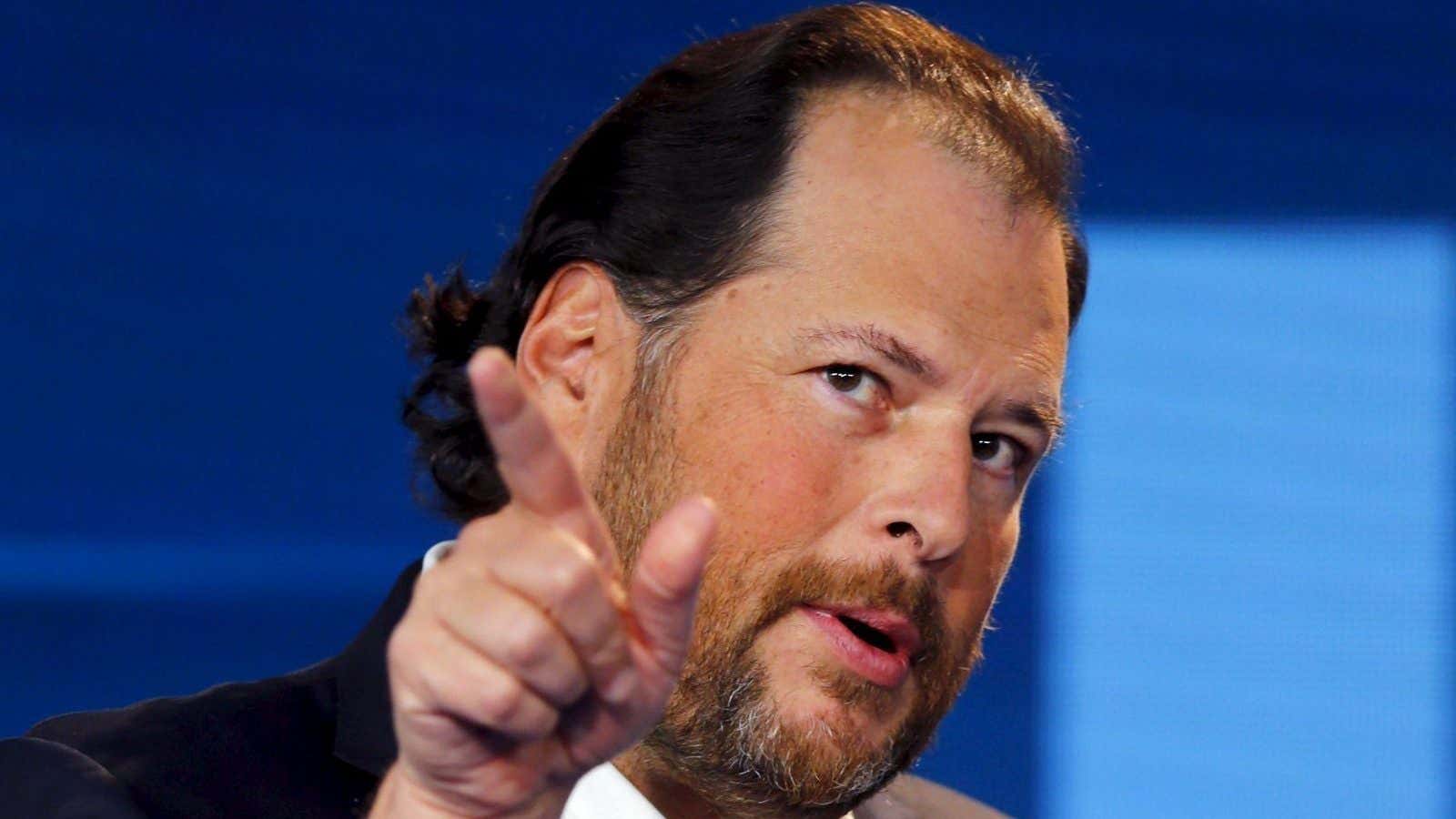If there’s one thing you might have heard about Salesforce, the San Francisco-based maker of cloud software for businesses, it’s that it’s supposed to be an incredible place to work.
The company routinely ranks high on lists of employers most admired for keeping its people happy. It rooted its culture in the idea of Ohana, the Hawaiian concept of families being bound together and responsible to one another. It pays employees to spend time volunteering for schools and charities. Its chairman and CEO, Marc Benioff, has taken loud, public positions on progressive political questions, facing off against leaders in the American bible belt, over issues such as state “bathroom laws” that would force transgender people to use a bathroom that doesn’t match their gender identity.
For all of these reasons, Benioff figured that his company, a massive tech player with a market cap of $87 billion, would not be stained by an injustice common to rival companies in tech and other industries: pay inequality for women.
As recently as 2015, however, this was not the case.
First comes denial
Benioff appeared on 60 Minutes this weekend to describe his company’s and his personal reckoning with pay inequality. He began by admitting to CBS journalist Lesley Stahl that when Cindy Robbins, Salesforce’s chief of personnel, raised the topic of potentially unfair pay practices a few years ago, he was in full denial.
Lesley Stahl: So, when Cindy Robbins came to you and said, “Do you know we may have a problem with unequal pay in the company,” what was your reaction?
Marc Benioff: Well, I said, “That’s not possible here.” You know, it’s—it’s not possible.
LS: Why was it impossible?
MB: It’s impossible because we have a great culture here. We’re—we’re a ‘best place to work.’ And we don’t do that kinda thing. We don’t play shenanigans paying people—paying people unequally. It’s unheard of. It’s crazy.
Next, bargaining
Robbins, apparently, was not as convinced. As the two weighed the benefits of looking into the data, she struck a deal with him. “The one thing we can’t do is do the assessment, look under the hood, see a big dollar sign, and shut the hood,” she said.
(As a woman, she may have had some insight into what was waiting for them. Later in the interview, she also tells Stahl that she can recall times in her own career when she wondered if she was receiving fair pay, but chose not to investigate so as not to become known as “the complainer.”)
Stahl asked Benioff, “So did you agree to the audit just to prove to her that she was wrong?”
He explained:
“I said, ‘Well, we have to do it.’ You know, she—she actually—she said, ‘Well, do you agree that we’re gonna pay men and women equally?’ I said, ‘Of course I agree.’ ‘Well, you—you know that—what—what it’s gonna cost you, don’t you?’ ‘I don’t know, what is it gonna cost me?’ ‘Well, I don’t know. You have to agree first.’ So, I said, ‘Okay—I agree. I agree.’ All right, let’s do this.
…followed by acceptance and a $3 million correction
As Quartz reported last September, that audit uncovered a statistical difference in pay between men and women. “It was everywhere,” Benioff told 60 Minutes. “It was through the whole company, every department, every division, every geography.”
He fixed that by bumping up pay for women earning less for the same work as men, which cost Salesforce $3 million. He also created a new rule that would make it more likely that women would be promoted and seen as leaders.
“Like, we would have a meeting and I would look around the room and I’m, like, ‘This meeting is just men. Something is not right,'” he told Stahl. So he declared he wouldn’t hold a meeting unless 30% of the participants were women.
Now, repeat
But the pay gap would not be vanquished for good by that first set of changes. When the company ran a second audit a year later, it found the gap had widened back out.
The gap returned because Salesforce had acquired dozens of smaller firms, and with them, their cultural norms and pay practices. Once again, Salesforce smoothed out salary differences, spending another $3 million.
The audit, the company realized, will have to be continuous.
Finally, evangelize
Benioff sees himself as someone who can show other corporate leaders how culture is done.
He says he doesn’t believe you can be a decent CEO in 2018 and not be committed to gender equality, but he’s had to convince other male leaders of its importance, and sometimes fields questions about whether the well-documented pay gap even exists.
“I’ve had CEOs call me and say, ‘This is not true. This is not real,'” he told Stahl. “And I’ll say to them, ‘This is true. Look at the numbers.'”
Indeed, that’s what Salesforce did.
“CEOs, with one button on one computer, can pay every man and every woman equally. We have the data. We know what everyone makes,” Benioff says. “There’s no excuse.”
This story is part of How We’ll Win, a project exploring the fight for gender equality at work. Read more stories here.
